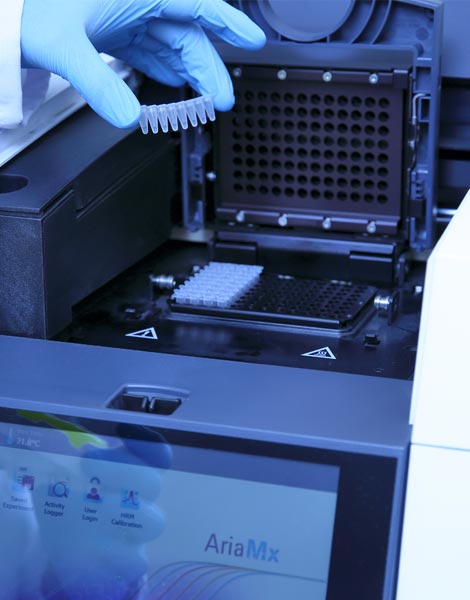Molecular Biological Analyses
In accordance with the Biosafety Law and the GMO Analysis Strategy instruction, we use DNA analysis techniques, which are the most reliable methods for the detection of GMOs in processed food, unprocessed food, feed and seed samples. When analysing processed foods, excessive processing during the production stages can cause DNA to degrade and make it difficult to detect. After DNA is isolated from these products, it is aimed to identify 35S Promoter, NOS Terminator, FMV Promoter regions within the scope of GMO Screening (CAMV) by Real-Time PCR method.
In case of negative results, advanced analysis techniques are applied in line with the customer's request and Soy-Cotton-Corn Plant Specific Screening is performed. If a positivity is detected here, the result is reached by continuing with the Type determination analysis.
DNA-based PCR test detects the presence of GMOs with the help of certified reference materials with a sensitivity of 10 Copies/Reaction. The analyses included in our scope;
- GMO Screening Analysis (p35S, tNOS, pFMV)- Kit Method (Bosphore GMO Screening Kitv3 Method)
- Plant Specific Soy Gene Screening-Kit Method (Bosphore Soy Species Detection Kitv1)
- DAS 44406-6 Soy Type Identification Analysis - EURL Method (QT-EVE-GM-015)
- DAS 68416-4 Soy Type Identification Analysis - EURL Method (QT-EVE-GM-013)
- DAS 81419-2 Soy Type Identification Analysis - EURL Method (QT-EVE-GM-014)
- MON 87701 Soy Type Identification Analysis- EURL Method (QT-EVE-GM-010)
- MON 87769 Soy Type Identification Analysis- EURL Method (QT-EVE-GM-002)
- MON 87708 Soy Type Identification Analysis- EURL Method (QT-EVE-GM-012)
- MON 87751 Soy Type Identification Analysis- EURL Method (QT-EVE-GM-016)
- CV 127 Soy Type Identification Analysis - EURL Method (QT-EVE-GM-011)
- DP305423-1 Soy Type Identification Analysis- EURL Method (QT-EVE-GM-008)
- Plant Specific Cotton Gene Scan-Kit Method (Bosphore Cotton Species Detection Kitv1)
- GHB614 Cotton Type Determination Analysis- EURL Method (QT-EVE-GH-006)
- 3006-210-23 Cotton Type Determination Analysis- EURL Method (QT-EVE-GH-001b)
- 281-24-36 Cotton Type Determination Analysis- EURL Method (QT-EVE-GH-001a)
- Plant Specific Corn Gene Scan-Kit Method (Bosphore Maize Species Detection Kitv1)
- DAS-40278-9 Maize Type Identification Analysis - EURL Method (QT-EVE-ZM-004)
Meat Species Determination;
Today, one of the biggest problems in the food industry is adulteration and the deterioration of the originality of food products. Mixing expensive red meat with cheap poultry or pork for economic reasons can lead to negative consequences for human health as well as religious inconveniences. Especially when meats with similar pigment structures such as beef-horse, beef-sheep and chicken-pork are mixed with each other, it becomes impossible for the consumer to detect this counterfeit. Such counterfeiting is frequently encountered in foods such as meatballs, sausages, salami, pastrami, gelatine. Speciation analysis, which is an extremely important analysis in detecting fraud and adulteration, is performed by our expert staff with a Real-Time PCR Device in our Molecular Biology Laboratory with a sensitivity of 0.05%.
Meat Species Determination Analyses;
- Species Identification (Pig DNA Search) - Bosphore Species Identification Pork Kit Method
- Species Identification (Fish DNA Search) - Bosphore Species Identification Kit Fish
- Species Identification (Horse DNA Search) - Bosphore Species Identification Horse Kit Method
- Species Identification (Donkey DNA Search) - Bosphore Species Identification Donkey Kit Method
- Species Identification (Bovine DNA Search) - Bosphore Species Identification Bovine Kit Method
- Species Identification (Chicken DNA Search) - Bosphore Species Identification Chicken Kit v1 Method
- Species Identification (Searching for Turkey DNA) - Bosphore Species Identification Turkey Kit v1 Method
You can contact us to test the compliance of your products with the regulations.


